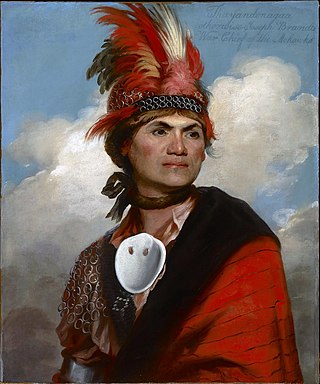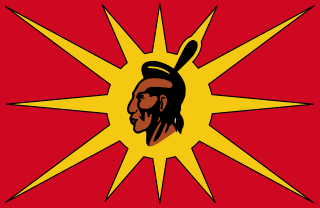
The Mohawk people are in the easternmost section of the Haudenosaunee, or Iroquois Confederacy. They are an Iroquoian-speaking Indigenous people of North America, with communities in southeastern Canada and northern New York State, primarily around Lake Ontario and the St. Lawrence River. As one of the five original members of the Iroquois League, the Mohawk are known as the Keepers of the Eastern Door – the traditional guardians of the Iroquois Confederation against invasions from the east.
The Oka Crisis, also known as the Kanehsatà:ke Resistance, was a land dispute between a group of Mohawk people and the town of Oka, Quebec, Canada, which began on July 11, 1990, and lasted 78 days until September 26, with two fatalities. The dispute was the first well-publicized violent conflict between First Nations and provincial governments in the late 20th century.

The Kahnawake Mohawk Territory is a First Nations reserve of the Mohawks of Kahnawá:ke on the south shore of the Saint Lawrence River in Quebec, Canada, across from Montreal. Established by French Canadians in 1719 as a Jesuit mission, it has also been known as Seigneury Sault du St-Louis, and Caughnawaga. There are 17 European spelling variations of the Mohawk Kahnawake.

Kanesatake is a Mohawk settlement on the shore of the Lake of Two Mountains in southwestern Quebec, Canada, at the confluence of the Ottawa and Saint Lawrence rivers and about 48 kilometres (30 mi) west of Montreal. People who reside in Kanehsatà:ke are referred to as Mohawks of Kanesatake. As of 2022, the total registered population was 2,751, with a total of about 1,364 persons living on the territory. Both they and the Mohawk of Kahnawake, Quebec, a reserve located south of the river from Montreal, also control and have hunting and fishing rights to Doncaster 17 Indian Reserve.

Alanis Obomsawin, is an Abenaki American-Canadian filmmaker, singer, artist, and activist primarily known for her documentary films. Born in New Hampshire, United States and raised primarily in Quebec, Canada, she has written and directed many National Film Board of Canada documentaries on First Nations issues. Obomsawin is a member of Film Fatales independent women filmmakers.
Kanehsatake: 270 Years of Resistance is a 1993 feature-length documentary film by Alanis Obomsawin, highlighting the events of the 1990 Oka Crisis. Obomsawin documents the events of The Siege of Kanehsatake over 78 days, capturing a rare perspective of an important turning point in Canadian history. Produced by the National Film Board of Canada, the film won 18 Canadian and international awards, including the Distinguished Documentary Achievement Award from the International Documentary Association and the CITY TV Award for Best Canadian Feature Film from the Toronto Festival of Festivals.

Billy Two Rivers was a Canadian Mohawk professional wrestler. He began wrestling professionally in 1953 and retired in 1977, having worked in the United States, United Kingdom, Japan and Canada.
Tracey Penelope Tekahentakwa Deer is a screenwriter, film director and newspaper publisher based in Kahnawake, Quebec. Deer has written and directed several award-winning documentaries for Rezolution Pictures, an Aboriginal-run film and television production company. In 2008, she was the first Mohawk woman to win a Gemini Award, for her documentary Club Native. Her TV series Mohawk Girls had five seasons from 2014 to 2017. She also founded her own production company for independent short work.

Kaniehtiio Alexandra Jessie Horn, sometimes credited as Tiio Horn, is a Canadian actress. She was nominated for a Gemini Award for her role in the television film Moccasin Flats: Redemption and she has appeared in the films The Trotsky, Leslie, My Name Is Evil, and The Wild Hunt, as well as the streaming television horror series Hemlock Grove and the sitcoms 18 to Life, Letterkenny and Reservation Dogs.
Joseph Tehwehron David (1957–2004) was a Mohawk artist who became known for his role as a warrior during the Oka Crisis in 1990.
Club Native is a 2008 documentary film by Tracey Deer, exploring Mohawk identity, community and tribal blood quantum laws. The film looks at how women in Deer's home community of Kahnawake risk losing their right to live on the reserve, after marrying non-natives.
Mohawk Girls is a 2005 documentary film by Tracey Deer about the experiences of adolescent girls growing up on the Mohawk reserve of Kahnawake, across the Saint Lawrence River from Montreal, Quebec. Deer, who was born and raised in Kahnawake, focuses on three young women: Felicia, Amy, and Lauren, a mixed race teen.

The Rotisken’rakéhte, also known as the Mohawk Warrior Society and the Kahnawake Warrior Society, is a Mohawk group that seeks to assert Mohawk authority over their traditional lands, including the use of tactics such as roadblocks, evictions, and occupations.
Mohawk Girls is a comedy-drama series developed by Tracey Deer based on her 2005 documentary Mohawk Girls. The program premiered on OMNI Television and on APTN in the fall of 2014 and entered its fourth season in 2016. It is available for streaming on CBC Gem and it was picked up by Peacock streaming service in 2021.
Sonia Boileau is a Canadian First Nations filmmaker belonging to the Mohawk Nation of the Haudenosaunee Confederacy.
Roxann (Karonhiarokwas) Whitebean is an independent film director and media artist from the Mohawk Territory of Kahnawake (Canada).

Kathleen Hepburn is a Canadian screenwriter and film director. She first attracted acclaim for her film Never Steady, Never Still, which premiered as a short film in 2015 before being expanded into her feature film debut in 2017. The film received eight Canadian Screen Award nominations at the 6th Canadian Screen Awards in 2018, including Best Picture and a Best Original Screenplay nomination for Hepburn.
Brittany LeBorgne is a Mohawk actress from Canada. She is most noted for her role as Zoe in the television series Mohawk Girls, for which she received a Canadian Screen Award nomination for Best Actress in a Comedy Series at the 4th Canadian Screen Awards in 2016.
Kiawenti:io Tarbell, known mononymously as Kiawentiio, is a First Nations (Mohawk) actress and singer-songwriter. She made her television debut in the third season of the CBC series Anne with an E (2019) and her film debut in Beans (2020). She starred as Maya Thomas in the sitcom Rutherford Falls (2021). She was cast as Katara in the Netflix live-action remake of Avatar: The Last Airbender (2024).
Rainbow Dickerson is an American actress. She is most noted for her performance as Lily in the 2020 film Beans, for which she won the Vancouver Film Critics Circle award for Best Supporting Actress in a Canadian Film at the Vancouver Film Critics Circle Awards 2020.








